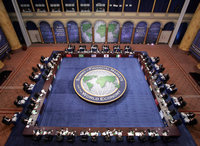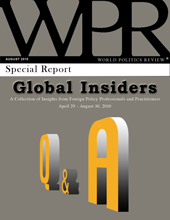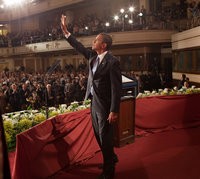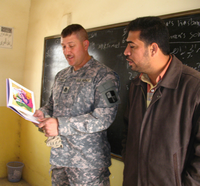I didn’t get to enjoy a full-fledged media fast during the three weeks I was away, as I managed to do last summer. But I did limit myself to urgent e-mails, the occasional online news item, and some print magazine reading. And I consider that kind of break from the information onslaught a vital exercise for the way it allows you to focus back in on the big stories that are sometimes obscured by the radio static of day-to-day international news and debate. Not that the latter is unimportant, just that the former is essential. The first thing that struck […]
Global Archive
Free Newsletter

At the end of last month, the National Research Council (NRC) released a report warning that U.S. nuclear forensics capacity — or the ability to determine the origin of material used in a nuclear explosion or for nuclear terrorism — was dangerously eroding, despite renewed government efforts to bolster it. “Although U.S. nuclear forensics capabilities are substantial and can be improved, right now they are fragile, under-resourced and, in some respects, deteriorating,” the report concluded. “Without strong leadership, careful planning and additional funds, these capabilities will decline.” The public document, entitled “Nuclear Forensics: A Capability at Risk,” summarized a classified […]
Trend Lines will return on August 30th. During this publishing hiatus, we will be taking time to think of new ways that we can better serve and inform our readers and perform routine site maintenance. Is there something you’d like us to discuss more on Trend Lines? Want to give us feedback? E-mail our Assistant Editor, Kari Lipschutz, at Kari@worldpoliticsreview.com. Check back in at http://www.worldpoliticsreview.com throughout the hiatus for limited time only content.

World Politics Review is not publishing the last two weeks in August. We will resume publishing again on Aug. 30. But during this time, we’ll be opening up some of our subscription-only content to non-subscribers. Today we feature an article that was part of our July 13 feature, “Rethinking the Post-American World.” In “A Second Tour Through the ‘Second World,’” Parag Khanna says that the insights generated from geopolitical schools of thought give us enormous foresight into global trends. And for better or worse, he argues, they support the argument that the global power structure continues to rapidly diffuse away […]

Global Insider is an ongoing World Politics Review interview series that examines developing trends in geopolitics. From maritime disputes and arms sales, to free trade agreements and evolving bilateral relations, Global Insider explores the foundations and implications of new developments in international affairs through the voices of preeminent experts that hail from government, academia and research institutions. Global Insider is published multiple times per week at worldpoliticsreview.com/trend-lines. On this page, and in a pdf document that is available for download by subscribers in our document center, we have collected every Global Insider interview conducted since the series began in April […]

At the beginning of this year, I made the following observation: The novelty of the Obama presidency has worn off. What remains will be a long, hard slog of rebuilding America’s global position. And while the fancy rhetoric of 2009 convinced many to give Washington a second chance, 2010 needs to be the year of delivery. If not, Obama will discover, as Bush did before him, that America cannot lead if others will not follow. More than halfway through 2010, the Obama administration has made some progress on a number of the foreign policy challenges facing the United States. There […]
NewsHour’s Spencer Michels reports from a Las Vegas hacker conference on governmental efforts to stop online tampering that could affect critical infrastructure. Attendees at the DefCon hacker convention explain the United State military’s reliance on networks and their extreme vulnerabilities to cyber attack. Michael Hayden, who was director of both the CIA and the National Security Agency, says of the attacks, “If you do something in the cyber-domain, something happens in physical space. This is not just a video game.”

In the 1980s, NATO ground troops in Europe faced a Warsaw Pact force of overwhelming size. To prepare to blunt a Soviet-led attack and overcome the Warsaw Pact’s numerical superiority, NATO adopted a revolutionary new idea. The so-called “AirLand Battle” concept, which originated in the U.S. Army’s training command, posited that forward-deployed NATO tanks and missile-armed infantry, supported by jet fighters carrying smart munitions, could beat a larger Warsaw Pact army. In Europe, the AirLand Battle concept never had a chance to prove itself. But its tenets shaped the U.S. approach to ground warfare in Operation Desert Storm in 1991 […]

While the traditional approach to national security would suggest that there is no linkage between the security of women and the security of states, there is an interesting new wave of research, informed by the life sciences, that is increasingly undermining that assumption. The organization of male-female relations within a society is one of its strongest and most influential characteristics. Where those relations are based on dominance and inequity, that template will affect the state and its security. Perhaps most interesting is that while the social sciences have been slow to pick up on this, these findings have enjoyed resonance […]

Sex trafficking is an exceedingly grotesque, highly profitable component of contemporary slavery. In fact, no form of slavery is nearly as profitable, and it can be argued that none is as barbarically exploitive. In the course of 10 years of research across 18 countries, I have directly interviewed more than 500 slaves of all kinds, and some of the most heartbreaking tales I heard were those narrated by women and children who suffered years of sexual enslavement at the hands of traffickers and pimps. Though much has improved as a result of anti-trafficking activism, policy, law, and media coverage since […]

In the post-Cold War world, the rapid social, political and economic transformations associated with globalization have coincided with the continuing spread of HIV/AIDS. In fact, it’s possible to argue that AIDS is both a product and a cause of globalization, understood here as the whole gamut of economic, social, political and epistemological ways in which more and more of the world is brought within similar systems of governance, consumption and imagination. Up to an estimated 14,000 people a day are infected with HIV, and in most parts of the world, infections are increasing more rapidly than are effective responses. In […]
Over the past six months, you’ve probably noticed a reduced blog output on my part. Part of that has had to do with the need to prioritize my time to make sure the front page and feature issues are the best they can be. But part of it has been due to the need to take care of personal matters, and in particular my son. For the past year, his mother has been battling an advanced-stage lung cancer. It’s a battle that she carried out with courage and dignity. It’s a battle that ended this past Saturday. I’ve tried for […]

American public diplomacy has been the subject of many reports and much discussion over the past few years. But one rarely examined element is the true impact of the Smith-Mundt Act of 1948, which for all practical purposes labels U.S. public diplomacy and government broadcasting as propaganda. The law imposes a geographic segregation of audiences between those inside the U.S. and those outside it, based on the fear that content aimed at audiences abroad might “spill over” into the U.S. This not only shows a lack of confidence and understanding of U.S. public diplomacy and international broadcasting, it also ignores […]

Disney is picking up steam in China, and in addition to bringing cartoon characters, theme parks, and Americana, it’s also bringing the English language. U.S. policymakers should take notice. During the next five years, Disney will spearhead a massive expansion of English-language schools in China, from a mere 11 today to 148 by 2015. According to Russell Hampton, president of Disney Publishing Worldwide, the expansion could deliver operating earnings of more than $100 million. In other words, teaching English is good for business. But it can also deliver strategic benefits in terms of trade, public diplomacy and even military strength. […]
